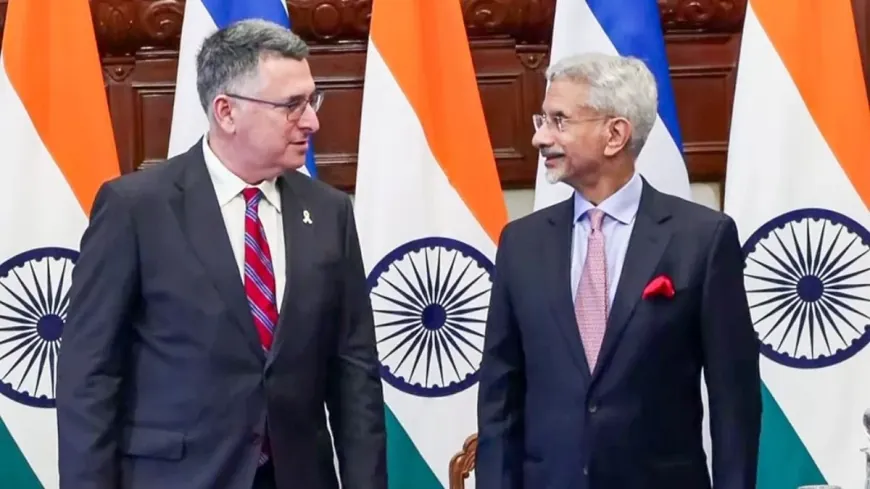India and Israel Sign Defense Technology MoU Focused on Joint Production and Research
India and Israel have signed a new defense technology MoU setting up joint production, research, and testing projects across missile, drone, and electronic warfare systems.

JERUSALEM — India and Israel on Tuesday signed a new Memorandum of Understanding (MoU) aimed at strengthening collaboration in defense technology, manufacturing, and research, signaling a more operational phase in their long-standing security relationship.
The agreement was finalized during the annual meeting of the India–Israel Joint Working Group (JWG) on defense cooperation, held in Jerusalem, Israel’s Ministry of Defense said in a statement.
New Agreement Focuses on Co-Development and Local Manufacturing
The latest MoU updates earlier defense cooperation frameworks and sets out a plan for joint design, production, and testing of advanced military systems.
Officials from both governments said the arrangement will streamline technology transfers and allow select Israeli systems to be built in India, reducing delivery times and production costs.
Amir Baram, Director General of Israel’s Ministry of Defense, said the updated pact moves the partnership from policy discussions to practical execution.
“Our cooperation with India is now centered on tangible projects — technology, manufacturing, and training,” Baram said after the signing in Jerusalem.
The framework builds on existing partnerships in missile systems, drones, and electronic warfare, where Israeli firms have worked with Indian public and private-sector companies for more than a decade.
Industry Engagement and Joint Development
During the JWG session, the visiting Indian delegation held discussions with senior executives from Israel’s major defense firms — Rafael Advanced Defense Systems, Israel Aerospace Industries (IAI), and Elbit Systems.
These companies already operate several joint ventures in India producing missile systems, unmanned platforms, and communication gear, and are expected to scale up production under the new framework.
According to officials, the talks also included presentations of next-generation Israeli defense technologies and plans for joint R&D projects in areas such as artificial intelligence, electronic warfare, and autonomous systems.
Possible Link to India’s Mission Sudarshan Chakra
The timing of the agreement coincides with India’s announcement of Mission Sudarshan Chakra, an initiative to develop an integrated air and missile defense network.
Analysts said Israel’s experience with systems such as Iron Dome, David’s Sling, and Arrow-3 could inform parts of India’s effort, particularly in radar integration and interceptor design.
No specific projects were confirmed, but India’s Ministry of Defence said cooperation in “emerging defense domains” remains a central part of bilateral talks.
High-Level Diplomatic Coordination
The MoU was signed in Jerusalem while Israel’s Foreign Minister Gideon Sa’ar was in New Delhi for meetings with External Affairs Minister S. Jaishankar.
Sa’ar said both countries are working toward a long-term strategic framework built on defense and technology collaboration.
He thanked India for its diplomatic support during Israel’s recent conflict with Hamas and noted that both countries “face similar threats from terrorism.”
The two ministers also reviewed joint participation in the I2U2 alliance — comprising India, Israel, the UAE, and the United States — and discussed progress on the India–Middle East–Europe Corridor (IMEC), a regional connectivity project linking trade and technology networks.
Defense Collaboration Over the Years
Israel has become one of India’s top three defense suppliers, accounting for about 13% of India’s defense imports between 2018 and 2023, according to the Stockholm International Peace Research Institute (SIPRI).
Major cooperative projects include:
-
Barak-8 surface-to-air missile system, co-developed by India’s DRDO and Israel’s IAI.
-
Heron TP unmanned aerial vehicles, operated by India’s armed forces.
-
SPICE precision-guided munitions, used by the Indian Air Force.
The new agreement builds on these programs by expanding joint research and localized production for potential export to third countries.
MoU Targets Joint Production and Technology Integration
Officials said the MoU emphasizes shared production pipelines rather than new weapons contracts, linking Israeli design expertise with India’s expanding defense manufacturing base.
In practical terms, this includes integrating Israeli guidance and electronics systems into Indian-built missile platforms, expanding co-production at facilities in Hyderabad, Nagpur, and Pune, and establishing new assembly lines for air-defense interceptors.
Two officials familiar with the discussions said a proposal is under review for a joint testing site in southern India, where radar and sensor components could be evaluated jointly under field conditions.
Both governments are also exploring a maintenance and upgrade program for Israeli-origin equipment already in Indian service, including drones and surveillance systems.
Rather than a ceremonial move, the MoU functions as an implementation roadmap designed to shorten approval cycles and remove bureaucratic hurdles that have slowed joint ventures in the past.
A senior Israeli defense industry source said the framework “formalizes what has been happening quietly for years, giving it the legal and political backing to move faster.”
Also Read: Nvidia Receives Dozens of Site Offers for Planned AI Campus in Israel































































